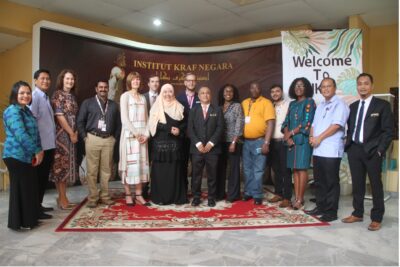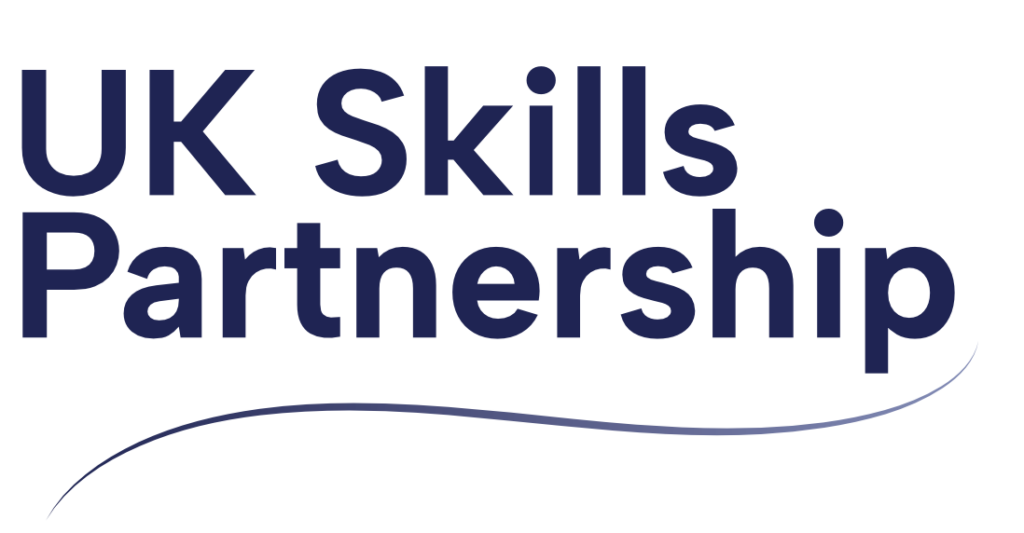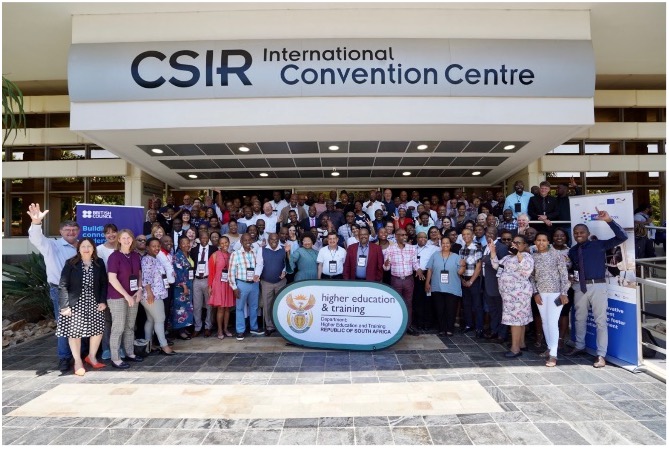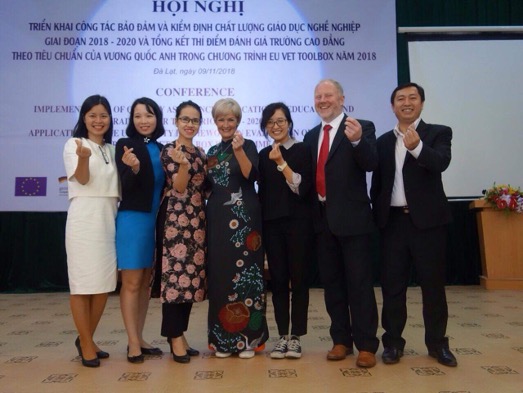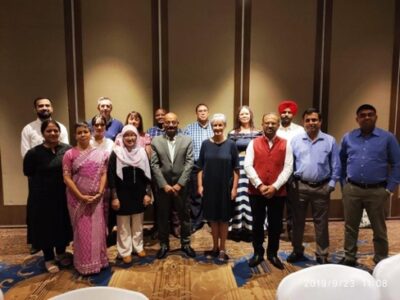
I-WORK: Improving Work Opportunities
I-WORK (Improving Work Opportunities – Relaying Knowledge) programme was established with the objective to support skills strengthening systems and enhance TVET in Commonwealth countries, with the overarching aim of improving job opportunities for young people. The programme was funded by the Foreign, Commonwealth and Development Office (FCDO) as part of the Commonwealth 18-20 programme, and included Ghana, South Africa, India (Punjab) and Malaysia as target countries.
The programme had an overall budget of £2 million and ran from November 2018 to March 2020. By promoting good practice, partnership working and knowledge exchange between Commonwealth member states at a policy and delivery level, the programme aimed to drive improved opportunities for young people whilst raising the knowledge and understanding of the Commonwealth and strengthening relationships with the UK. The programme had three strands; partnerships, apprenticeships and dissemination.
NI Colleges were active on the partnership strand, connecting training providers in five Commonwealth countries, the UK, Ghana, South Africa, India and Malaysia, in partnership clusters to:
- Developing innovative, inclusive and employer-led education approaches that equip students to take their place in the future job market
- Preparing students for employment using work-based learning models (enterprise and entrepreneurship) and piloting “Skills Training Centres” in each country
- Providing teacher training on the Colleges’ Project Based learning pedagogical approach
- NI Colleges led two international clusters, involving a total of 8 international TVET organisations. This included:
Malaysia: Politeknik Muadzam Shah, Malaysian Handicraft Development Corporation
Ghana: Accra Technical Training Centre, Doress Fashion Institute
India: Empower Pragati Vocational & Staffing Pvt Ltd, LabourNet
South Africa: NCR TVET College, Gert Sibande TVET College
Northern Ireland (NI) Colleges is an alliance of six regional Further and Higher Education Colleges, located in Northern Ireland (UK), specialising in Technical and Vocational Education and Training (TVET). Collectively, NI Colleges operate across 40 campuses, resourced by 3,500 professional and technical staff who service some 154,000 annual enrolments. Working alongside a network of 10,000 employers, NI Colleges provides a highly innovative curriculum that ensures learners develop professional and technical skills, increasingly at higher levels, to meet employer needs.
NI Colleges has a successful track record of delivering TVET training and capacity building projects across the globe with 250 international partnerships and over 60 “live” annual projects. It sends 600 students and 220 staff on mobility each year and welcome over 420 visitors to learn, share best practices and explore the cultural aspects of life in Northern Ireland, UK.
The 6 colleges that make up Northern Ireland Colleges are:
Skills gaps and youth unemployment present a significant challenge to economic growth and social cohesion.
Ghana, South Africa, India and Malaysia were selected on the basis that all four countries suffer from high rates of youth unemployment and under-employment. The four countries are all engaged in skills reform and could benefit from international collaboration to enhance their employer engagement and apprenticeship policy frameworks.
The opportunity for NI Colleges was to contribute to positive systemic and institutional TVET change across the Commonwealth, by supporting the development of sustainable partnerships between employers and training providers through mentorship of UK best practices and models.
To improve the employment prospects of young people, including those from disadvantaged backgrounds, NI Colleges would support the TVET Colleges to piloting and introduce new approaches to employer led skills development.
NI Colleges has direct experience of engaging with employers and employer bodies with around 10,000 employer engagements annually. Our innovative industry-led practices and programmes include graduate skills interventions, apprenticeships, assured skills academies and models for implementing industrial advisory boards and sustainable employer-led forums.
NI Colleges strategic employability model focuses on ensuring that the employer-led curriculum is embedded; this is delivered through Enterprise/Entrepreneurship, Project Based Learning (PBL), vocational competitions (internal and external), student companies, student industry projects, employability, employer talks, work placements, employer visits, employer forums, bespoke solutions to address employer skills gaps.
This ensured that our curriculum meets the current and future needs of employers and this was shared with the four countries involved.
NI Colleges was appointed as the ‘lead partner’ in two interventions to drive forward and co-ordinate the collaboration within the clusters. As lead, NI Colleges had a key mentorship role, working across partner TVET colleges to build their capacity in key areas related to enabling employer lead education including industry relationships & management, co-design of curriculum, quality assurance processes, and establishing a pilot programme of Skills Centres within each country.
The key tasks involved in this international project included:
- Conducting a baseline survey within the clusters to identify where employer-led education sits as a priority in each of the respective countries.
- Organising for participating TVET Colleges to travel to attend two global meetings, introducing colleges to their peer’s approaches on employer-led education, work-based learning & apprenticeship provision.
- Co-development of innovative country-specific pilot projects to improve employer led education.
- Regular online mentorship provided by NI Colleges to share information and exchange ideas and learning, specific to their pilot project.
- Working collaboratively with the TVET Colleges to design a suitable project, timetable key activities, monitor & disseminate best practice.
- Developing and delivering a Project Based learning teacher training course to support the cluster in strengthening employer engagement through the application of the model to “real-life” projects to improve student employability skills
The multilateral partnership model enabled close collaboration and information sharing between the focal countries and UK partner colleges. Moreover, the support from the NI Colleges was found to be very useful, due to our strong technical experience of employer-led learning approaches.
The intervention directly built the capacity of TVET leaders and practitioners across the Commonwealth through peer to peer mentoring on new approaches that would better meet the needs of employers. In the short-term the intervention promoted good practice, partnership learning and ensured new approaches were introduced at local and regional level to enable employer led education including the setting up of industrial advisory boards and skills training centres.
Some specific long-term outcomes include:
- By 2021 Gert Sibande TVET College will increase the number of graduates who gain permanent employment by 10% of the students/graduates that exit the training from campuses and the skills academy and artisan development centre.
- A Sustainability Plan Committee will be commissioned and members will be industry experts of AGI (Association of Ghana Industry), and professionals from TVET Industries and Training providers from other Garment institutions. The purpose is to help manage the impact level of the Project and make provision for funding and Capacity Building.
- All the learning from the projects will be incorporated in the curriculum and courses for similar job roles to ensure student and employer satisfaction.

